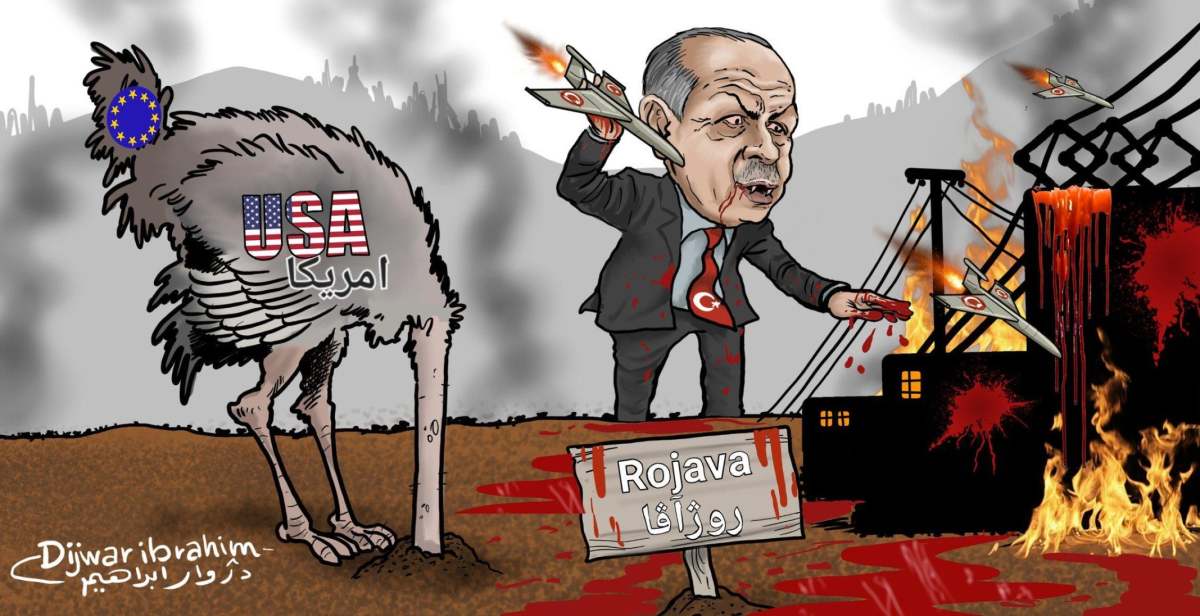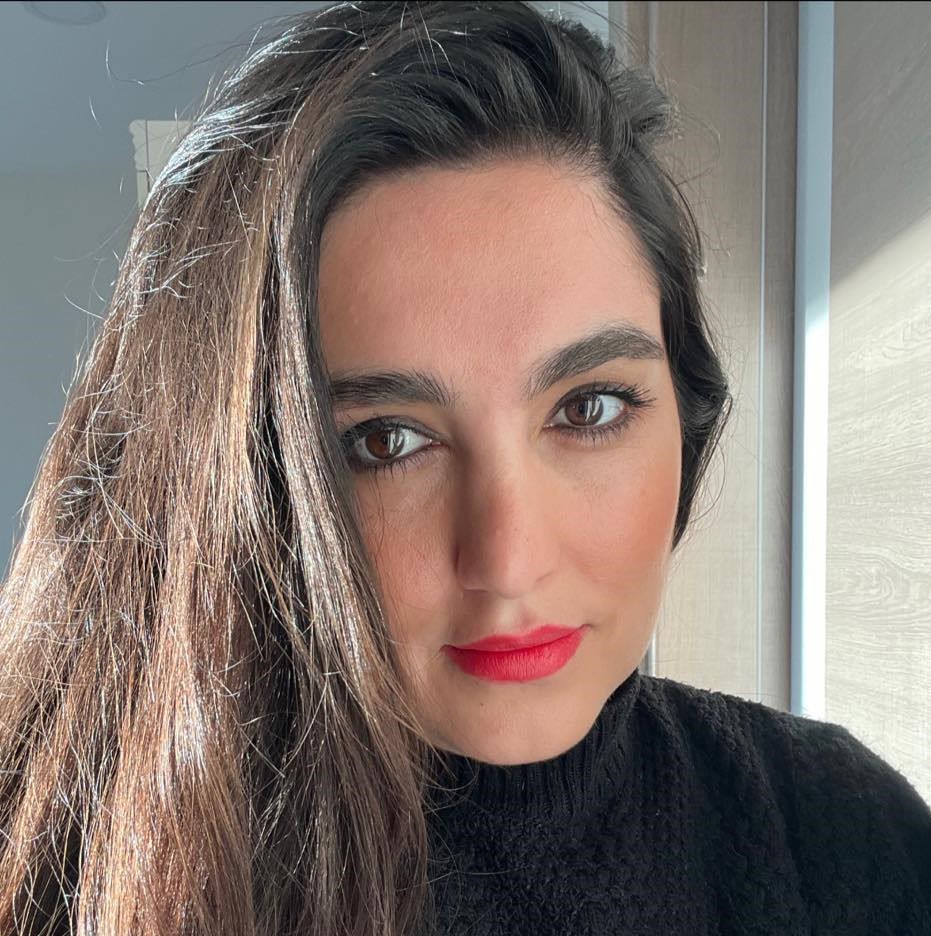Erdoğan’s Air Force Lays Waste to Rojava Amidst Global Silence
By Dr. Hawzhin Azeez
Erdoğan’s regime in Turkey has continued its reign of terror on the Kurdish region of Rojava, which is governed by the DAANES (Democratic Autonomous Administration of North and East Syria). Ankara’s litany of weekly war crimes for the past several months involves ceaseless bombardments, airstrikes, and drone attacks across a wide range of civilian sites. To understand the reasoning behind their aerial terror, one only needs to look at the recent history and neo-Ottomanist foreign policy objectives of Turkey when it comes to the Kurdish areas of northern Syria.
For instance, the Turkish military has already annexed large swaths of the Kurdish territories in the region, including utilizing their jihadist mercenary allies to occupy Afrin in 2018 and Serê Kaniyê and Girê Spi in 2019. Both invasions ethnically cleansed the regions of Kurds by more than 80% resulting in close to a million people being internally displaced.
Back in October 2023, when the bombardments commenced at unprecedented levels, refugee camps of internally displaced people were also attacked, causing mass terror and uncertainty. But this also coincides with Turkey’s previous playbook, where they sow fear amongst Kurdish civilians in the hope that they will flee the region. Since October, Turkey has commenced a comprehensive round of repeated bombardments targeting essential infrastructure such as water, gas, and electricity stations. The objective is to displace civilians, cause a mass exodus, and create conditions that make life unbearable in the region.
In the past 72 hours, a number of villages and civilian locations, including barns and food depots, have been targeted by Turkish airstrikes. As a result, journalists, activists, and civilians across the region shared horrifying images of injured civilians, destroyed warehouses, and repeated attacks on non-military locations, including the illegal double-tap policy of re-striking a site that had been previously attacked as emergency crews scrambled to put out the fires and treat any wounded.
In the village of Karbatli, in the Darbasiyah district, the family home of a civilian named Khaled Heso was bombed, resulting in his children Rojan and Jan, along with his wife Ahlam being injured. Meanwhile, the Kurdish journalist Hoshang Hassan released exclusive footage of the Turkish bombardments against electric stations in Amuda. Showing that Turkey is most interested in striking the necessities of life: food, water, electricity, and shelter (homes).
The Rojava Information Center (RIC) released an exclusive video detailing the Turkish bombardments since October, highlighting the repeat targeting of civilians and their land, homes, and properties during the bombardments. During the Christmas period, another round of massive bombardments occurred, in which Turkish airstrikes hit a number of civilian infrastructures, including factories, medical centers, industrial warehouses, and more. In the most recent cascade of unprovoked strikes, 11 civilians were killed, with dozens more injured.
Turkey also specifically targeted crucial gas and electrical facilities around Suwaydiyah. This electrical station, according to the RIC produces 47% of the Jazire canton’s total electrical supply. More importantly, it is the only station providing electricity to emergency lines for essential medical services and the area’s only local gas bottling plant. Displaying the sinister nature of the strikes, Turkey wants the Kurdish population thirsty, hungry, cold, and in the dark, but without fuel to flee. Then, following the Turkish drone strikes, the ambulances and hospitals lack fuel to treat any of the wounded.
Farhad Shami, the media representative of the SDF released a press statement on behalf of the SDF General Command, in which he stated that: “Over the past two days, the Turkish occupation has targeted, using warplanes and UAV’s key energy and electricity facilities, as well as grain storage warehouses and silos and firefighting crews. These aggressions have extended to the homes of civilians, their farms, and the sources of their daily sustenance, impacting major roads and city outskirts and causing extensive destruction. Consequently, these attacks have disrupted the delivery of essential services, including power, electricity, water, and other necessities, affecting hundreds of thousands of people.”
Shami went on to state that:
“These direct attacks and barbaric terrorist aggression clearly and explicitly prove the hostility of the Turkish occupation state to all forms of life in the region, they constitute blatant and deliberate war crimes aimed at instilling fear, and inflicting suffering on their daily existence.”
Likewise, the media representative for the YPG, Siyamend Ali published a number of videos on his media page, which included images of the Turkish warplanes bombing journalists and media crews in the city of Kobanê, as well as recordings of Turkish drones targeting the French Lafarge Cement Company in the Chelabiya district east of Kobanê. The video shows a second “double tap” strike as firefighting crews attempt to douse the fires—a common tactic of Turkey at this point, which is against international law.
Meanwhile, another local journalist, Jamal Bali, stated that after a full day of bombardments by the Turkish state on service facilities across the region, “most of the region’s residents are now without water and electricity” during a harsh and cold winter.
For their part, the Kongra Star Women’s Movement released a report that highlighted the bombardments over the last 48 hours across the Amuda district. In Kobanê alone, wheat warehouses, orchards, fire crews, electricity transfer stations, and livestock barns have been targeted by ongoing strikes. Meanwhile, five electrical service stations were also bombed again around Kobanê.

Human rights advocates have weighed in on the ongoing Turkish bombardments as well. Nadine Maenza, an American advocate for international religious freedom and a former chair at USCIRF, has questioned why the US government allows Turkey to continue to engage in war crimes against the Kurds, when such attacks benefit Iran, Assad, and ISIS while, according to her, running counter to US goals for peace and stability in the region. Maenza went on to condemn the Turkish assault on Rojava and its explicit targeting of civilian infrastructure and she has called for the international community to stand firm against ongoing Turkish war crimes against the Kurds.
Additionally, scholars such as Gerald Walker, an expert in global diplomacy and international relations, have argued that Turkey’s “attacks seem to be part of a strategy to displace the local population, furthering a policy of Turkification and extending Turkish control over this Syrian territory.” However, as Walker points out, while Turkey is attempting to gain further Syrian territory, these territories are explicitly Kurdish-dominated areas of the country. Turkey’s Syria policy is driven solely by its exterminationst aspirations towards the Kurds. This is despite the fact that the PYD and the SDF have not fired a single bullet or rocket towards the Turkish border. Rather it seems the repeated military losses that Turkey’s allied jihadists in Syria suffered at the hands of the Kurds continue to prompt Ankara’s resentful and vengeful anti-Kurdish policies across the Kurdish regions in northern Syria and Iraq (Western and Southern Kurdistan, respectively).
Other activists called for the urgent implementation of a No-Fly Zone in the region or for the US-led coalition to provide the Kurds with air defense systems and the necessary technology to protect themselves against the ceaseless Turkish bombardments.
In light of the total absence of international outcry about Turkey’s unhindered and unrestrained violence towards Rojava, it appears unlikely that such war crimes will cease anytime soon. As the world reels from the war in Gaza and South Africa’s ICJ case is played out across TV screens, the same international media outraged by Israel’s bombing of Palestinians, remains silent and apathetic as Turkey bombs Kurds and attempts to raze Rojava to the ground.




Comments are closed.